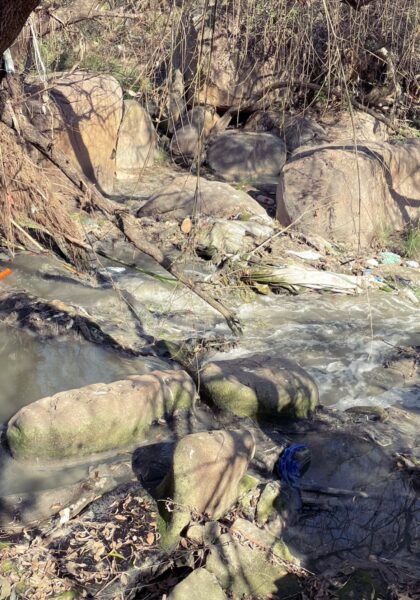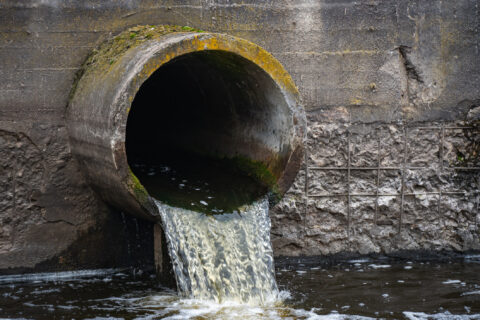Sunday Times Green PR
Waste Water In Industry – A Necessary Evil Or An Opportunity For Change?
Kate Stubbs, Marketing Director at Interwaste
While we acknowledge that industries across various sectors contribute significantly to economic growth and development, the unfortunate reality is that some of their operations also generate large volumes of wastewater, which can contain harmful toxins and chemicals and therefore, need to be managed according to the requisite legislation to prevent pollution. Every industry including municipal services, that uses water contributes further to its degradation if conservation, compliance and management practices are not put in place and adhered to.
What is concerning however, is the 2023 Green Drop Watch Report, which measures the state of wastewater treatment works, as it shows that 39% of South Africa’s treatment works are in a critical state. As the population grows and we witness more urbanisation, the treatment of water waste needs serious action. With increasing volumes and the fact that much of this wastewater contains harmful pollutants and chemicals, we need to start thinking about the possibilities of treating water within industry, which can then be re-used onsite and into other industrial processes. As with every other waste, we need to start looking at wastewater with a ‘nothing wasted’ mindset and find ways to take the water we have available, and effectively manage it for re-use, repurposing and bringing it back to its natural state.
In fact, nearly all effluent water (wastewater from sewers or industrial outlets) can be recycled, and when done properly, can create a strong solution for water sustainability. As a result, a large bank of water could become available for redistribution into the environment for irrigation, dust suppression, industrial cleaning, as well as to replenish rivers and catchments in our water infrastructure networks.
Unfortunately, though, we have a conundrum where business, community and at some levels of Government – are still under informed about the potential of well-managed, compliant, and innovative waste management solutions. Yes, we must also fix the infrastructure and skill deficiencies, but right now wastewater treatment can, and must, play a pivotal role in reducing water scarcity. Without this, the lack of adequate clean water required to meet safe standards, human drinking water and sanitation needs will remain.
In this space, some waste companies, in line with the ban of liquid waste to landfill disposal and broader sustainability goals, are already using various technologies to treat and process effluent streams to a level where they can be recycled and reused for various purposes. When we examine industries and factories specifically, today there are specialised facilities which are designed to treat and purify industrial wastewater and ensure it’s safe before it is released into the environment. An example of this is our own leachate and Effluent Treatment Plant (ETP) which has been specifically designed to treat contaminated liquids from our own landfill sites, as well as treat third party liquid waste streams from industrial plants – so in essence it detoxifies, neutralises, and treats harmful waste, all while “capturing” hazardous chemicals into a solid matrix (which is then returned to the landfill in a stabilised fashion). Added to this, approximately 80% of what is fed to the ETP ends up as clean water – all while ensuring compliance with environmental regulations and minimising negative impacts on ecosystems and public health.
Given that 7 of the 13 major water systems in South Africa are predicted to be in deficit by 2040 and the demand for water is expected to exceed available supply by 2030, we need to find solutions – like investments into ETP plants – to ensure the redistribution of water into the environment is undertaken and done so effectively. This is how we create a strong solution for water sustainability and access, by making use of water that was previously not deemed safe for consumption and creating a much more diverse water mix, which includes groundwater and wastewater re-use. Similarly, it creates that eco-system of circularity to ensure waste is used as a resource.
Of course, legislation such as the ban of liquid waste disposal to landfill, for example, as well as rising ESG pressures, are driving innovation in the waste sector and forcing corporate South Africa to be more agile in their approach to both the use, reuse and impact on our water supply.
However, let’s consider the obvious. Not all waste can be re-used or recycled and where it can, sometimes costs can be prohibitive. Therefore, waste management strategies within the industrial space must also examine the full value chain of waste they create and ensure that the growing waste generated by the very communities and businesses it serves can be best managed and disposed of. Even though landfill disposal is the lowest option in the hierarchy of waste management, engineered landfills and associated waste management practices remain compliant and cost effective and so are still an attractive and safe option for managing a wide variety of waste types. However, with landfill airspace diminishing across the country, and evolving legislation, we must consider the vital importance of effectively managing the volumes of waste generated.
We take safe water availability for granted, but with the increasing demands on limited water resources, the potential for water scarcity to become a severe crisis in South Africa unfortunately remains, especially for industries that use large volumes of water. So, it is up to industry and government to take control today – especially in areas where we can reuse and repurpose vulnerable water sources to feed back into industry – if we hope to see a marked difference and extend the water lifeline in South Africa.






 Sign-up and receive the Business Media MAGS newsletter OR SA Mining newsletter straight to your inbox.
Sign-up and receive the Business Media MAGS newsletter OR SA Mining newsletter straight to your inbox.